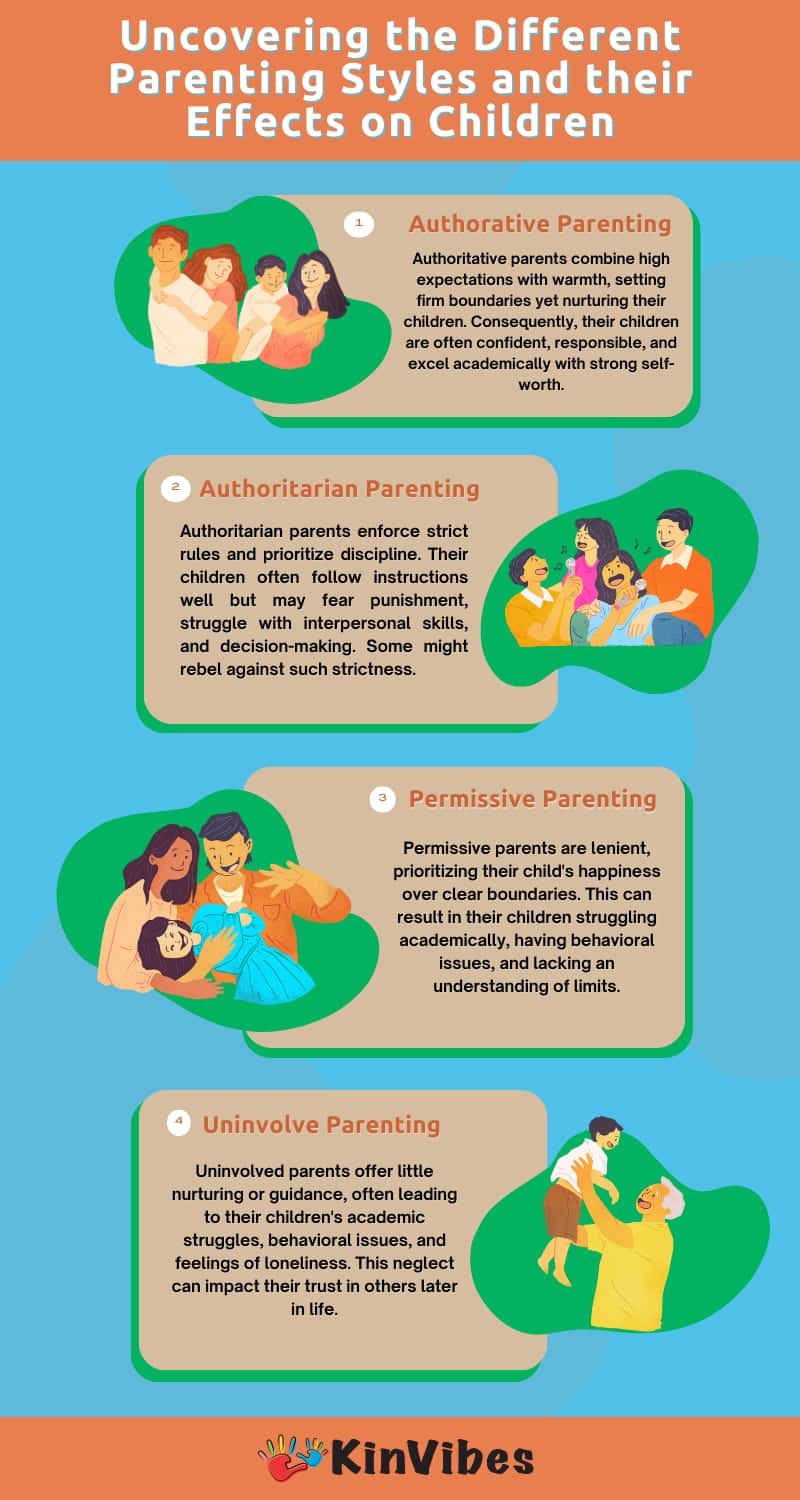Family Dynamics
Uncovering the Different Parenting Styles and Their Effects on Children

Parenting is a complex and multifaceted journey, and your chosen approach can significantly impact your child’s development. With numerous parenting styles and strategies to choose from, it’s essential to find the one that best suits your family and meets your child’s unique needs. This article explores the different parenting styles, their effects on children, alternative approaches, and how to adapt your parenting style to foster a healthy, well-adjusted child.
Key Takeaways
- Understanding the four core parenting styles and their effects on children’s development.
- Exploring alternative approaches to find the best fit for one’s family, considering cultural and social influences.
- Enhancing your approach by setting boundaries, using positive reinforcement, fostering communication, and adapting to individual needs.
Understanding the Four Core Parenting Styles

Developmental psychologist Diana Baumrind identified four major parenting styles that are widely recognized in the field of child psychology. These four parenting styles are:
- Authoritative parenting
- Authoritarian parenting
- Permissive parenting
- Uninvolved parenting
Each style has its unique characteristics and effects on children’s behavior, academic achievement, and emotional well-being.
We will now examine each of these parenting styles in detail, focusing on their unique characteristics and their impact on child-rearing.
| Parenting Style | Key Characteristics | Effects on Children |
|---|---|---|
| Authoritative | – High expectations – Warmth – Clear rules – Supportive discipline |
– Confident – Responsible – Emotionally regulated |
| Authoritarian | – Strict rules – Harsh punishments – Focus on obedience |
– Fear of punishment – Poor interpersonal skills – Possible rebellion |
| Permissive | – Few rules – Leniency – Focus on being a friend |
– Struggle academically – Behavioral issues – Low self-esteem |
| Uninvolved | – Minimal nurturing – Low expectations – Lack of involvement |
– Poor academic performance – Behavioral issues – Low happiness levels |
If you’re intrigued by the balance between affection and structure, our guide to Balancing Warmth and Discipline: The Benefits of Authoritative Parenting Styles offers a comprehensive exploration. Discover how this style can be a game-changer for child development.
Authoritative Parenting Approach

Authoritative parenting, also known as the authoritative parenting style, is a balanced approach that combines high expectations with warmth, clear rules, and supportive discipline. Some characteristics of authoritative and other parenting styles include:
- Enforcing rules consistently
- Using praise and reward systems to promote positive discipline
- Fostering nurturing relationships with children
- Encouraging independence
This approach is considered to be effective in promoting healthy child development.
Children raised by authoritative parents tend to display confidence, responsibility, and the ability to regulate their emotions.
They usually are known for their amicable behavior and inquisitiveness.
They take pride in accomplishing goals. Research has shown that children raised with authoritative discipline are generally happy and successful and less likely to develop mental health issues. They are also skilled at making wise decisions and assessing safety risks independently.
Authoritarian Parenting Approach
Strict rules, harsh punishments, and a focus on obedience characterize the authoritarian parenting style. Communication is often one-way, with the authoritarian parent imposing rules and orders without room for discussion. High parental control and low responsiveness are typical traits of authoritarian parents, who employ stern discipline and severe punishment to gain behavioral and psychological control.
Children of authoritarian parents tend to excel at following instructions and exhibit exemplary behavior. However, they may develop a fear of punishment and lack experience in decision-making, leading to rebellion, poor interpersonal skills, and difficulty making judgments independently.
Research indicates that these children of helicopter parents may experience higher levels of depression and diminished self-esteem compared to those raised by authoritative parents, and they may be more likely to become bullies.
Permissive Parenting Approach
Permissive parenting is marked by few rules, leniency, and a focus on being a friend rather than a parent. It differs from gentle parenting, which does not involve having few regulations or not upholding them. Permissive parents are often indulgent parents, prioritizing their child’s happiness and desires over setting boundaries and expectations.
The consequences of permissive parenting force children can be detrimental. Children raised by permissive parents are more likely to:
- Struggle academically
- Exhibit behavioral issues
- Have low self-esteem
- Be at a heightened risk of developing health problems, such as obesity and dental cavities, due to a lack of parental guidance in maintaining healthy habits.
Ever wondered about the effects of giving children ample freedom without boundaries? Our detailed analysis of Freedom or Overindulgence: Unpacking Permissive Parenting Styles delves into this approach’s potential benefits and pitfalls.
Uninvolved Parenting Approach
Uninvolved parenting is characterized by minimal nurturing, low expectations, and a lack of involvement in the child’s life. Often associated with neglectful parents, this approach fails to provide the emotional support and guidance necessary for a child’s healthy development.
Children of uninvolved parents typically demonstrate poor academic performance, recurrent behavioral issues, and low happiness levels. Psychology Today states that these same children tend to “internalize the pain and loneliness,” with adults who were neglected experiencing symptoms of post-traumatic stress disorder and requiring significant trauma resolution.
A lack of emotional attachment in childhood can also hinder the ability to trust others in later life.
While various parenting styles have their merits and drawbacks, some can be particularly impactful, albeit silently. To understand the subtleties and consequences of a hands-off approach, don’t miss our article on The Silent Impact: Understanding Uninvolved Parenting Styles.
The Impact of Parenting Styles on Child Development

Parenting styles can significantly influence various aspects of a child’s behavior and development. Here are some examples:
- Authoritative parenting fosters well-adjusted and successful children.
- Authoritarian parenting may lead to children with low self-esteem and poor decision-making skills.
- Permissive parenting often results in children who struggle academically and have low self-regulation abilities.
- Uninvolved parenting may cause social, emotional, and self-esteem issues.
The impact of your parenting style on your child’s development should not be overlooked, as it can mold their academic success, emotional health, and social competencies. Adapting your parenting style to meet your child’s needs and temperament better can help ensure a more positive outcome, setting them up for success in life.
Exploring Alternative Parenting Approaches

Aside from the four core types of parenting styles, several different parenting styles have emerged over the years. These include:
- Attachment Parenting: Focuses on developing a strong bond between parents and infants
- Positive Parenting: Emphasizes fostering children’s positive development through praise and reward systems
- Gentle Parenting: Involves setting clear boundaries and using natural consequences to guide children
- Helicopter Parenting: Entails excessive involvement in children’s lives, often hindering their independence
Tiger parenting is another approach characterized by high expectations and strict discipline, often associated with Asian cultures. Conversely, free-range parenting encourages children to explore their environment and learn from their experiences, granting them greater autonomy than traditional parenting styles.
Each of these alternative approaches comes with its own set of advantages and disadvantages; hence, finding the one that corresponds best with your family’s dynamics and your child’s distinct needs is crucial.
Adapting Your Parenting Style to Meet Your Child’s Needs

Gaining insight into your child’s temperament is a key factor in tailoring your parenting style to their needs. Knowing their temperament can help you comprehend their behavior and react to it in a way that benefits them. Addressing your child’s behavior and issues requires steadfastness and resolve, offering positive reinforcement for appropriate behavior, along with patience and understanding.
To enhance your parenting style, you can:
- Establish clear expectations
- Reward positive behavior
- Be consistent
- Take the time to attend to your child’s needs
- Be tolerant and understanding when addressing behavioral problems
- Always adapt your approach to suit your child’s unique temperament and requirements
Cultural and Social Influences on Parenting Styles

Cultural and social factors can significantly impact parenting styles. Ethnicity, socioeconomic status, and societal expectations can shape the methods parents use when raising their children. Cultural norms, beliefs, and values influence parental cognitions and practices when raising children, while social influences, such as peers, family, and media, can also affect parenting styles.
Being aware of these factors and considering their potential impact on your parenting approach is critical. Embracing cultural diversity and understanding social influences can help you adapt your parenting style to better meet your child’s needs and create a nurturing environment in which they can thrive.
Parenting Practices vs. Parenting Styles
While parenting styles refer to the overall approach and emotional climate in which parents raise their children, parenting practices encompass specific actions and behaviors that parents engage in when interacting with their offspring.
For example, setting bedtime routines, teaching manners, and helping with homework are all examples of parenting practices.
Both parenting styles and practices considerably influence a child’s development, encompassing their emotional, social, and cognitive growth. By understanding the difference between these concepts, you can better tailor your approach to parenting and adapt both your own neglectful parenting style and practices to ensure the best possible outcome for your child.
Tips for Improving Your Parenting Style
The following tips may be worth considering to enhance your parenting style:
- Set clear boundaries and expectations for your child, ensuring they understand the consequences of their actions.
- Use positive reinforcement to encourage good behavior, praising and rewarding them when they meet your expectations.
- Foster open communication with your child, discussing their feelings, thoughts, and concerns openly and honestly.
Additionally, be mindful of your child’s unique needs and temperament, adapting your parenting style to suit their individual requirements. By doing so, you can create an environment in which your child can develop and thrive, ultimately setting them up for success throughout their child’s life.
Frequently Asked Questions
What are the 4 types of parenting styles?
The 4 main parenting styles are authoritarian, authoritative parent, permissive, and neglectful. These styles were identified by Diana Baumrind, Eleanor Maccoby, and John Martin, each focusing on unique approaches for how parents raise their children.
What is the 5th parenting style?
The 5th parenting style is known as over-involved parenting, also referred to as ‘snow plowing’ or ‘helicopter parenting’, fourth style which involves being present in every aspect of their child’s life. This style of parenting is characterized by a high level of involvement and control in a child’s activities, decisions, and experiences. Over-involved parents often take excessive responsibility for their children’s experiences and, at times, their successes or failures.
While it is rooted in the parents’ love and concern, over-involved parenting can lead to children’s lack of self-confidence, independence, and problem-solving skills. It may also cause stress, anxiety, and low self-esteem in children as they may feel constantly monitored and judged.
However, it’s important to note that every parenting style, including this one, has its strengths and weaknesses. For instance, children of over-involved parents may feel secure, cared for, and valued, as their parents show a great interest in their lives.
In essence, the key is finding a balance and adapting the parenting style to the child’s individual needs, temperament, and the context of the situation.
What is the most common parenting style?
The most common parenting style is authoritative permissive parenting style, with most parents utilizing a combination of styles.
What is the hardest parenting style?
Neglectful parenting, also known as an uninvolved parent or parenting, is the hardest parenting style. It not only promotes leaving kids to fend for themselves, but it also offers very little care and engagement with them, leading to negative outcomes for the child. This parenting style can have a lasting impact on the child’s development, leading to issues such as low self-esteem, poor academic performance, and behavioral problems.
How can I adapt my parenting style to better meet my child’s needs?
Understand your child’s temperament, set clear expectations, use positive reinforcement, and foster open communication to adapt your child’s basic parenting style and better meet your child’s needs.
Wrapping Up Parenting Styles
In conclusion, understanding different parenting styles and their effects on children is essential for raising well-adjusted, successful individuals. By examining the various approaches, adapting your parenting style to meet your child’s needs, and considering cultural and social influences, you can create a nurturing environment in which your child can thrive.
Remember, no one-size-fits-all approach exists, so it’s crucial to find the best parenting style together that best suits your family and your child’s unique personality.
